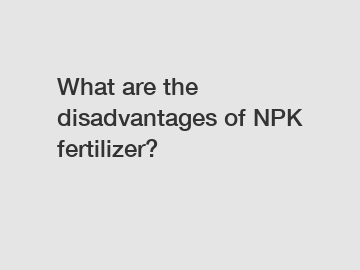What are the disadvantages of NPK fertilizer?
If you're into gardening or farming, you've probably heard about NPK fertilizer. It's a popular choice for many people because of its ability to boost plant growth. However, like everything else, NPK fertilizer has its drawbacks. In this article, we'll discuss some of the disadvantages of using NPK fertilizer.
Inorganic Nature.
One of the main disadvantages of NPK fertilizer is that it is synthetic and inorganic. This means that it is not a natural product and can have negative effects on the environment. The chemicals in NPK fertilizer can leach into the soil and water, causing pollution and harm to plants and animals.

Nutrient Imbalance.
NPK fertilizer contains only three essential nutrients - nitrogen, phosphorus, and potassium. While these nutrients are important for plant growth, using only NPK fertilizer can lead to nutrient imbalances in the soil. Other important nutrients like calcium, magnesium, and sulfur may be lacking, which can affect plant health and productivity.
Build-Up of Salts.
Another disadvantage of NPK fertilizer is that it can lead to a build-up of salts in the soil. This is because NPK fertilizer contains high levels of soluble salts, which can accumulate over time and become toxic to plants. The excess salts can also disrupt the soil's pH balance, making it less hospitable for plant growth.
Environmental Impact.
The production and use of NPK fertilizer can have a negative impact on the environment. The manufacturing process involves the use of fossil fuels and other resources, which can contribute to air and water pollution. Additionally, the excessive use of NPK fertilizer can lead to nutrient runoff, contaminating rivers and lakes and causing harm to aquatic life.
Reduced Soil Health.
Using NPK fertilizer over time can also lead to a decline in soil health. The overreliance on synthetic fertilizers can deplete the soil of its natural nutrients and beneficial microorganisms. This can result in compacted soil, poor drainage, and reduced nutrient availability for plants.
Limited Long-Term Benefits.
While NPK fertilizer can provide a quick boost to plant growth, its benefits may be short-lived. The fast-release nutrients in NPK fertilizer are quickly absorbed by plants, but may not last long in the soil. This means that frequent applications of NPK fertilizer may be necessary to maintain plant health, leading to increased costs and environmental impact.
In conclusion, while NPK fertilizer can be a useful tool for boosting plant growth, it comes with its own set of disadvantages. From nutrient imbalances to environmental impact, using NPK fertilizer may not be the best choice for sustainable gardening or farming practices. It's important to consider these drawbacks and explore alternative methods of fertilization to ensure the long-term health of your plants and the environment.
If you have any questions or are looking for a more environmentally friendly fertilizer option, feel free to contact us. Our knowledgeable suppliers can help you find the right solution for your gardening needs.
Want more information on ammonium sulfate granular, NPK BLUE granulated fertiliser, fertilizer npk 12 12 17? Feel free to contact us.



